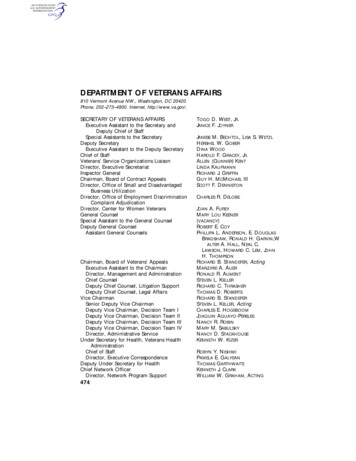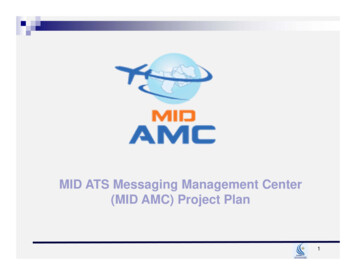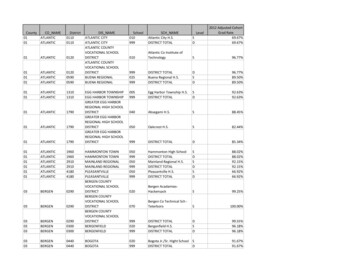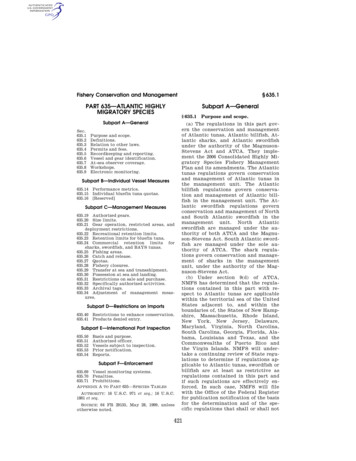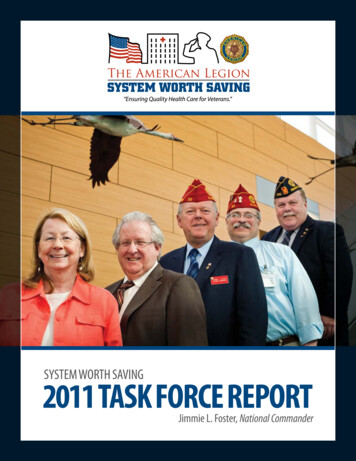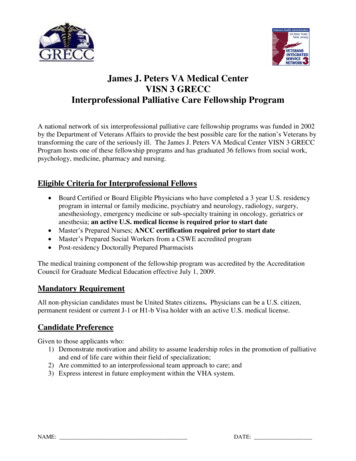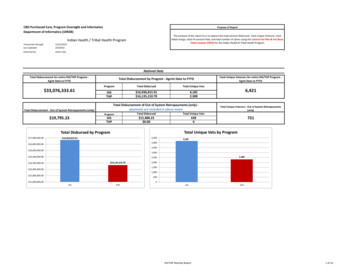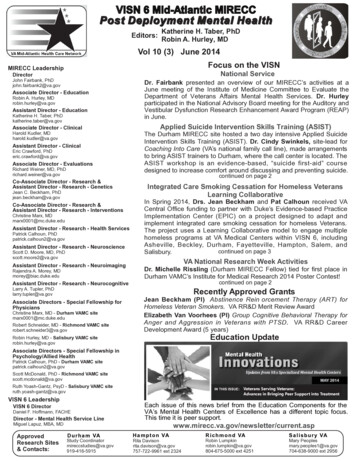
Transcription
VISN 6 Mid-Atlantic MIRECCPost Deploymen t MentalMent al Hea lt hEditors:Katherine H. Taber, PhDRobin A. Hurley, MDVol 10 (3) June 2014Focus on the VISNMIRECC LeadershipNational ServiceDirectorJohn Fairbank, PhDjohn.fairbank2@va.govAssociate Director - EducationRobin A. Hurley, MDrobin.hurley@va.govAssistant Director - EducationKatherine H. Taber, PhDkatherine.taber@va.govAssociate Director - ClinicalHarold Kudler, MDharold.kudler@va.govAssistant Director - ClinicalEric Crawford, PhDeric.crawford@va.govAssociate Director - EvaluationsRichard Weiner, MD, PhDrichard.weiner@va.govCo-Associate Director - Research &Assistant Director - Research - GeneticsJean C. Beckham, PhDjean.beckham@va.govCo-Associate Director - Research &Assistant Director - Research - InterventionsChristine Marx, MDmarx0001@mc.duke.eduAssistant Director - Research - Health ServicesPatrick Calhoun, PhDpatrick.calhoun2@va.govAssistant Director - Research - NeuroscienceScott D. Moore, MD, PhDscott.moore2@va.govAssistant Director - Research - NeuroimagingRajendra A. Morey, MDmorey@biac.duke.eduDr. Fairbank presented an overview of our MIRECC’s activities at aJune meeting of the Institute of Medicine Committee to Evaluate theDepartment of Veterans Affairs Mental Health Services. Dr. Hurleyparticipated in the National Advisory Board meeting for the Auditory andVestibular Dysfunction Research Enhancement Award Program (REAP)in June.Applied Suicide Intervention Skills Training (ASIST)The Durham MIRECC site hosted a two day intensive Applied SuicideIntervention Skills Training (ASIST). Dr. Cindy Swinkels, site-lead forCoaching Into Care (VA’s national family call line), made arrangementsto bring ASIST trainers to Durham, where the call center is located. TheASIST workshop is an evidence-based, “suicide first-aid” coursedesigned to increase comfort around discussing and preventing suicide.continued on page 2Integrated Care Smoking Cessation for Homeless VeteransLearning CollaborativeIn Spring 2014, Drs. Jean Beckham and Pat Calhoun received VACentral Office funding to partner with Duke’s Evidence-based PracticeImplementation Center (EPIC) on a project designed to adapt andimplement integrated care smoking cessation for homeless Veterans.The project uses a Learning Collaborative model to engage multiplehomeless programs at VA Medical Centers within VISN 6, includingAsheville, Beckley, Durham, Fayetteville, Hampton, Salem, andcontinued on page 3Salisbury.VA National Research Week ActivitiesDr. Michelle Rissling (Durham MIRECC Fellow) tied for first place inDurham VAMC’s Institute for Medical Research 2014 Poster Contest!continued on page 2Assistant Director - Research - NeurocognitiveLarry A. Tupler, PhDlarry.tupler@va.govRecently Approved GrantsAssociate Directors - Special Fellowship forPhysiciansChristine Marx, MD - Durham VAMC sitemarx0001@mc.duke.eduRobert Schneider, MD - Richmond VAMC siterobert.schneider3@va.govJean Beckham (PI) Abstinence Reinforcement Therapy (ART)R ) forHomeless Veteran Smokers. VA RR&D Merit Review AwardElizabeth Van Voorhees (PI) Group Cognitive Behavioral Therapy forAnger and Aggression in Veterans with PTSD. VA RR&D CareerDevelopment Award (5 years)Education UpdateRobin Hurley, MD - Salisbury VAMC siterobin.hurley@va.govAssociate Directors - Special Fellowship inPsychology/Allied HealthPatrick Calhoun, PhD - Durham VAMC sitepatrick.calhoun2@va.govUpdates from VA’s Specialized Mental Health CentersScott McDonald, PhD - Richmond VAMC sitescott.mcdonald@va.govMAY 2014Ruth Yoash-Gantz, PsyD - Salisbury VAMC siteruth.yoash-gantz@va.govVISN 6 LeadershipVISN 6 DirectorDaniel F. Hoffmann, FACHEDirector - Mental Health Service LineIN THIS ISSUE:Each issue of this news brief from the Education Components for theVA’s Mental Health Centers of Excellence has a different topic focus.This time it is peer support.Miguel Lapuz, MBA, MDApprovedResearch Sites& Contacts:D u r h a m VAStudy s Serving Veterans:Advances in Bringing Peer Support into Treatmentwww.mirecc.va.gov/newsletter/current.aspH a m p t o n VARita Davisonrita.davison@va.gov757-722-9961 ext 2324R i c h m o n d VARobin Lumpkinrobin.lumpkin@va.gov804-675-5000 ext 4251S a l i s b u r y VAMary Peoplesmary.peoples1@va.gov704-638-9000 ext 2956
VISN 6 Mid-Atlantic MIRECCPost Deployment Mental HealthFocus on the VISNVol 10 (3) June 20142Focus on the VISNApplied Suicide Intervention Skills TrainingVA National Research Week ActivitiesThe thirty attendees at the Durham training includedparticipants from Durham VA (Peer Support Specialists,Suicide Prevention Team members, Coaching Into Carestaff, MIRECC research staff), Hampton VA (MIRECCresearch staff), an employee from the Department ofHealth and Human Services, and students and staff fromthe Duke Psychiatry program. They join the more thanone million participants worldwide who have completed thetraining.Poster presenters were judged on how well they wereable to relate their research to the general public. Herr e s e a r c h p o s t e r wa s T h e R e l a t i o n s h i p B e t w e e nSubjective Sleep Duration, Anger and AggressiveImpulses in PTSD. Co-authors included MIRECCpersonnel (Cindy Swinkels, Eric Elbogen, PatrickCalhoun) and Durham VAMC trainees (Jennifer O’Brien,Jamie Hughes). The prize was 1,000 in funding tosupport Michelle’s research into the association of sleepdisorders to poor outcome in individuals with PTSD.continued from page 1continued from page 1This training proved interactive, practical, and practiceoriented. Initially, individuals within smaller groupsdiscussed personal attitudes and reactions towards suicide,then transitioned into recognizing signs when someonemight be at risk of suicide. The remainder of the traininginvolved roleplaying suicide intervention scenarios utilizingthe Pathway for Assisting Life (PAL) model. The PALmodel entails building rapport with a person-at-risk, askingdirectly about suicide, and hearing their story. Thentogether, the helper and the person-at-risk identify areason for living, shift thinking towards safety, and developa safety plan. After plan development, the helper confirmsaction items with the individual to encourage follow through. MIRECC personnel (Scott McDonald, Treven Pickett,Robin Lumpkin, Christina Sheerin, Lillian Stevens)Participants were encouraged to use the PAL model in hosted a table at the Richmond VAMC’s annual Researchboth work and personal arenas in which they encounter a Day. In addition to offering an opportunity for Veterans toperson-at-risk. Many attendees expressed higher comfort volunteer for MIRECC research projects, they handed outlevels around addressing suicidality, and a greater information on local and national VA clinical services aswillingness to intervene.well as resources offered by the OEF/OIF/OND Team.Journal ArticlesAllen JP, Nieuwsma JA, Pollitt MJ, Blazer D. Recoveryon higher ground: Spirituality in Treatment of AddictiveDisorders. Current Psychiatry. 2014;13: 24-40.continued on page 4CBOC Mental Health RoundsEach CBOC MH Rounds presentation is now offeredtwice a month.Wednesday July 9 from 9-10 am ETThursday July 10 from 12-1 pm ETAddressing Pain: A Primer forMental Health ProvidersYou must register in TMS for these sessions inadvance to receive credit.August 13 & 14 Veterans’ Justice ProgramEvaluation of CognitiveSept 10 & 11Complaints in a Clinical SettingObstructive Sleep ApneaOct 8 & 9Contact Ashley McDaniel with any questions:ashley.mcdaniel@va.gov or 501-257-1223Invited LecturesDurham MIRECC personnel Mira Brancu, Eric Crawford,Mary Pender and Unber Ahmad (pictured on left)participated in the recent national Women VeteransHealth Summit. Dr. Brancu received a letter from Mr.Hoffman, VISN 6 Network Director, expressing hisappreciation for their efforts in support of the event.D r. M i r a B r a n c u ( M a n a g i n g D i r e c t o r, M I R E C COEF/OIF/OND Registry) and Dr. Richard Ogle presenteda workshop The ACT of Self-Care: An Acceptance andCommitment Therapy (ACT) Approach to the EthicalPrinciple of Psychologist Self-Care at the North CarolinaPsychology Association Continuing Education Institutes& Spring Conference, April 25-26, 2014, Charlotte NC.continued on page 4
VISN 6 Mid-Atlantic MIRECCPost Deployment Mental HealthResources for Building ResiliencyMOVING FORWARDOVERCOMING LIFE’S CHALLENGESwww.StartMovingForward.orgThe VA and DoD partnered to develop a free andanonymous on-line education and life coachingprogram that uses interactive exercises and videodemonstrations to teach skills for overcoming lifechallenges such as relationship problems, financialhardship, and re-adjustment issues.Meeting PresentationsMarch 27 - 30 2014, Chicago ILKimbrel NA, Calhoun PS, Elbogen EB, Brancu M,MIRECC Registry Workgroup, Beckham JC. Therelationship between psychiatric comorbidity and violence,incarceration, suicide attempts, and suicidality among Iraqand Afghanistan era veterans.Kimbrel NA, Calhoun PS, Elbogen EB, Brancu M,MIRECC Registry Workgroup, Beckham JC. The factorstructure of psychiatric comorbidity amongIraq/Afghanistan-era veterans and its relationship toviolence, incarceration, suicide attempts, and suicidality.Vol 10 (3) June 20143Focus on the VISNIntegrated Care Smoking Cessation forHomeless Veterans Learning Collaborativecontinued from page 1The Learning Collaborative approach is team-based,and combines clinical training and skill building withsharing, testing and spreading of implementationstrategies and creative solutions. The project hasreceived incredible support from local and nationalexperts in smoking cessation and homelessness,including VISN6 Homeless Coordinator Jeff Doyle.Local project leader and MIRECC staff member AngelaKirby has worked with EPIC staff members to developand provide training for homeless program clinicians andprescribers. In April, Durham VA and MIRECC staffmembers, including Eric Dedert, Jennifer Runnals,Vickie Carpenter, Emily Gentes, and Michelle Rissling,were primary clinical faculty in a two-day local trainingsession for nearly forty care providers from across theVISN. Since that training, care providers have attended bi weekly clinical calls in which issues related to clinicalcompetence, organizational challenges, and veteranengagement have been discussed. Since that training,providers in VISN homeless programs have begun toprovide best practice smoking cessation treatment tohomeless Veterans who wish to quit smoking.April 15 - 17, 2014, Williamsburg, VA.Stevens LF. Parenting After TBI: Review of Issues andNovel Intervention for Military Families.continued on page 5MIRECC Research Featured!Brief Screening Tool Uses Five Questions toIdentify Violence Risk Among VeteransThe stresses of military deployment and combat haveraised concerns about the risk of violence among asubset of returning troops. Now a new evidence-basedscreening tool can help identify candidates for a morecomprehensive assessment of risk and protectivefactors, writes Eric Elbogen, PhD (associate professorof psychiatry at the University of North Carolina Schoolof Medicine) and colleagues in AJP in Advance.Elbogen EB, Cueva M, Wagner HR, Sreenivasan S,Brancu M, Beckham JC, Van Male L. Screening forViolence Risk in Military Veterans: Predictive Validity ofa Brief Clinical Tool. American Journal of Psychiatry.2014; [Epub ahead of print]Learning Collaborative personnel (L to R) EPIC staffmembers Grahme Smith, Caren Swanson, and KarenGoetz, Durham VA study coordinator Vickie Carpenter,and MIRECC staff member Angela Kirby.In June, MIRECC and EPIC staff provided an all-dayvirtual learning session in which homeless program staffparticipated in a Veteran panel discussion, receivedtraining in Motivational Interviewing, and participated in apanel discussion with national VA smoking cessationexperts. Next steps in the Learning Collaborative includecontinued bi-weekly clinical calls and site visits by EPICa n d M I R E C C s ta f f t o h e l p t e a m s t r o u b l e s h o o timplementation and engagement barriers. The LearningCollaborative series will culminate in a two-day learningsession designed to enhance continued implementationof smoking cessation with homeless Veterans.Clinical UpdateThis article from 2011 is still in the “top 10"!Kudler H, Straits-Tröster K, Brancu M. Initiatives toimprove access to behavioral health services in theVeterans Affairs Health System. North Carolina MedicalJournal; 2011;72(1):40-2.
VISN 6 Mid-Atlantic MIRECCPost Deployment Mental HealthProgram UpdateEngaging Chaplains in MH CareThis project is funded by Central Office and housed withinour MIRECC. Dr. Keith Meador directs the initiative, andDr. Jason Nieuwsma serves as associate director.Kickoff events for two major projects have been heldin the past few months:Mental Health and Chaplaincy Learning CollaborativeTeams are from all over the country and from allbranches of the military! Seven VA teams (chaplain,mental health provider, and systems redesign coach)attended the face-to-face kickoff in Hampton, VA on April8-9. Seven DOD teams attended a virtual kickoff on June3-4.VVol 10 (3) June 20144Invited Lecturescontinued from page 2Dr. John Fairbank (MIRECC Director) presented VA MidAtlantic (VISN 6) Mental Illness Research, Education andClinical Center (MIRCC): Overview of Activities Relevantto Mental Health Services for OEF/OIF/OND Veterans ata June meeting of the Institute of Medicine Committee toEvaluate the Department of Veterans Affairs MentalHealth Services.D r. R o b i n H u r l e y ( M I R E C C A s s o c i a t e D i r e c t o r,Education) presented Making a Difference: Research in asmall VAMC can change lives as part of the CharlesGeorge VAMC Making a Difference research retreat, May20 2014, Asheville, NC. Dr. Hurley also presented MentalHealth Implications for the Blast-exposed Patient as partof the Audiology Online Webinar Auditory AssessementMental Health Integration for Chaplain Services (MHICS) of the Blast-exposed Patient in June. This webinar wasThe 20 VA and 20 DOD chaplains who will be completing presented in partnership with the Defense Hearing Centerthis year-long mental health certification training program of Excellence.attended the event, May 21-23 in Hampton, VA. MHICSrelies heavily on distance education using online Meador KG, Nieuwsma JA. Expanding the role ofapproaches such as Blackboard and Adobe Connect. It chaplains. Invited talk presented at the VA Mental Healthincludes 3 face-to-face events over the course of the year. Showcase, May 2014, Washington, DC.MIRECC Research Featured!Major Depressive Disorder Has Affected NearlyHalf of Female OIF/OEF VeteransNieuwsma JA, Cantrell W. Acceptance and commitmenttherapy (ACT): Building evidence-based skills to enhanceprofessional chaplaincy. Half-day workshop presented atthe Association of Professional Chaplains AnnualConference, June 2014, Anaheim CA.MIRECC Faculty Honored. John Curry, PhD, and his colleagues at the VA MidAtlantic Mental Illness Research, Education, andClinical Center (MIRECC) analyzed data from 1,700veterans who had served during the operations in Iraqand Afghanistan. . The researchers found nearly halfof the women (46.5%) and slightly more than one-thirdof men (36.3%) experienced major depressivedisorder during their lifetimes (MDD-L).Curry JF, Aubuchon-Endsley N, Brancu M, RunnalsJJ, VA Mid-Atlantic MIRECC Women VeteransResearch Workgroup, VA Mid-Atlantic MIRECCRegistry Workgroup, Fairbank JA. Lifetime majordepression and comorbid disorders among current-erawomen veterans. Journal of Affective Disorders. 2014;152-154: 434-40.Journal Articlescontinued from page 2Brancu M, Thompson NL, Beckham JC, Green KT,Calhoun PS, Elbogen EB, Robbins AT, Fairbank JA;VA Mid-Atlantic MIRECC Registry Workgroup, WagnerHR. The impact of social support on psychologicaldistress for U.S. Afghanistan/Iraq era veterans with PTSDand other psychiatric disorders. Psychiatry Research.2014; 217 (1-2): 86-92.Bulling D, DeKraai MB, Abdel Monem T, Nieuwsma JA,Cantrell W, Ethridge K, Meador KG. Confidentiality andmental health/chaplain collaboration. Military Psychology.2014; 25: 557-567.continued on page 5Dr. Mira Brancu (far left) and her seven ColleagueAssistance Committee (CAC) co-members receivedthe North Carolina Psychology Association (NCPA)President’s Award for their work on psychologist selfcare, wellness, and impairment intervention educationand outreach. The CAC is charged with developingeducation, peer consulation, and other resources tofacilitate the optimal functioning of psychologists inNorth Carolina. They have offered workshops andwritten articles on a variety of topics related toprevention and amelioration of profession distress andimpairment including peer consultation, compassionfatigue, workplace safety, and managing difficultconversations with colleagues. The CAC also offers a24-hour helpline service for psychologists. Dr. Brancujoined the CAC shortly after it was formed in 2007.
VISN 6 Mid-Atlantic MIRECCPost Deployment Mental HealthJournal Articlescontinued from page 4Dennis PA, Ulmer CS, Calhoun PS, Sherwood A,Watkins LL, Dennis MF, Beckham JC. Behavioralhealth mediators of the link between posttraumatic stressdisorder and dyslipidemia. Journal of PsychosomaticResearch. 2014 Jul;77(1):45-50.Elbogen EB, Johnson SC, Newton VM, Timko C,Vasterling JJ, Van Male LM, Wagner HR, Beckham JC.Protective Mechanisms and Prevention of Violence andAggression in Veterans. Psychological Services. 2014;11(2) :220-228.Elbogen EB, Johnson SC, Wagner HR, Sullivan C,Taft CT, Beckham JC. Violent behaviour and posttraumatic stress disorder in US Iraq and Afghanistanveterans. British Journal of Psychiatry. 2014; 204:368 375.Green KT, Hayward LC, Williams AM, Bryan BC, TaberKH, VA Mid-Atlantic MIRECC Workgroup, DavidsonJR, Beckham JC, Calhoun PS. Examining the FactorStructure of the Connor-Davidson Resilience Scale (CD RISC) in a Post 9/11 U.S. Military Veteran Sample.Assessment 2014; 21(4):443-451.Gierisch JM, Nieuwsma JA, Bradford DW, Wilder CM,Mann-Wrobel MC, McBroom AJ, Wing L, Musty MD,Ch o b o t MM, Ha s s e l b l a d V, Wi l l i am s JWJ r.Pharmacological and behavioral interventions to improvecardiovascular risk factors in people with serious mentalillness: A systematic review and meta-analysis. Journal ofClinical Psychiatry. 2014; 75 (5): e424-440.Hall KS, Beckham JC, Bosworth HB, Sloane R, PieperCF, Morey MC. PTSD is negatively associated withphysical performance and physical function in olderoverweight military veterans. Journal of RehabilitationResearch and Development. 2014; 51 (2): 285-296.Kudler H. Commentary: Helping clinicians who care fortrauma survivors. Journal of the American Academy ofPhysician Assistants. 2014; 27(5):12-3.Lamar CD, Hurley RA, Rowland JA, Taber KH. Posttraumatic epilepsy: review of risks, pathophysiology, andpotential biomarkers. Journal of Neuropsychiatry andClinical Neuroscience. 2014; 26(2) :iv-113.Li W, Wu B, Batrachenko A, Bancroft-Wu, V, Morey RA,Shashi V, Langkammer C, De Bellis MD, Ropele S,Song AW, Liu C. Differential developmental trajectoriesof magnetic susceptibility in human brain gray and whitematter over the lifespan. Human Brain Mapping. 2014;35(6):2698-713Sripada RK, Welsh RC, Marx CE, Liberzon I. Theneurosteroidsallopregnanoloneandd e h y d ro e p ia n d ro s t e ro n e mo d u la t e re s t in g -s ta t eamygdala connectivity. Human Brain Mapping. 2014;35(7): 3249-3261.continued in next columnVisit our web site for more resourceshttp://www.mirecc.va.gov/visn6.aspVol 10 (3) June 20145Meeting Presentationscontinued from page 3SOCIETY FOR THEPSYCHOLOGY OF RELIGION AND SPIRITUALITYdivision 36Drescher KD, Currier JM, Nieuwsma JA. Chaplain viewsof suffering and professional quality of Life. In Trauma andSpirituality. SymposiumVIRGINIA PSYCHOLOGICAL ASSOCIATIONSpring Convention & Educational ConferenceApril 23 - 25 2014, Norfolk VAErickson HJ. What Do We Know About Recovery fromPTSD? Contributions for Neuroimaging.Stevens LF, Hinesley J. Parenting Among MilitaryFamilies and The Circle of Security Intervention .June 18 - 22 2014, Anaheim CAFitchett G, Nieuwsma JA, Meador KG. Evidence-basedchaplaincy care: Attitudes and practices in diversehealthcare chaplain samples.Jackson GL, Fortune-Greeley AK, Gierisch JM, DattaSK, Stolldorf DP, Cantrell WC, Ethridge AK, Angel C,Millspaugh D, Bauch SL, Nieuwsma JA. Implementingthe Warrior to Soul Mate Program: A partnered evaluationto assess sustainability of a program for enhancingveterans’ intimate relationships.Journal ArticlesSzabo ST, Kilts JD, Naylor JC, Youssef NA, Strauss JL,Morey RA, Brancu M, Hamer RM, Bradford DW; VAMid-Atlantic MIRECC Work Group, Marx CE. Aminoacids as biomarker candidates for suicidality in maleOEF/OIF veterans: Relevance to NMDA receptormodulation and nitric oxide signaling. Military Medicine,179 (5): 486-491.Van Voorhees EE, Hamlett-Berry K, Christofferson D,Beckham JC, Nieuwsma JA. No wrong door to smokingcessation care: A Veterans Affairs chaplain survey.Military Medicine. 2014; 179 (5): 472-476.Volz AR, Dennis PA, Dennis MF, Calhoun PS, WilsonSM, Beckham JC. The role of daily hassles and distresstolerance in predicting cigarette craving during a quitattempt. Nicotine and Tobacco Research. 2014; 16 (6):872-875.Wilson SM, Dedert EA, Dennis PA, Dennis MF,Calhoun PS, Kirby AC, Beckham JC. Do ethnicity andgender moderate the influence of posttraumatic stressdisorder on time to smoking lapse? Addictive Behaviors.2014; 39 (7): 1163-1167.
VISN 6 Mid-Atlantic MIRECCPost Deployment Mental HealthVol 10 (3) June 20146FreeWeb Courses for ProvidersTreating the Invisible Wounds of Warwww.ahecconnect.com/citizensoldierClick on New Users to register. You will then see the available web courses listed:1 - Post Traumatic Stress Disorder (english & spanish editions)2 - A Primary Care Approach3 - Issues of Women Returning from Combat4 - Recognizing the Signs of mTBI during Routine Eye Examinations5 - Understanding Military Family IssuesThese courses were developed by MIRECC faculty in collaboration with Citizen Soldier Support Program (CSSP)and North Carolina Area Health Education Center (NC AHEC). They are designed to help primary care physicians,case workers, mental health providers - who may see a veteran or family member on an unrelated issue - developa better understanding of the culture in which veterans and their families live and work, and provide best practicesfor identifying, assessing and treating mental health problems that result from the trauma of war.Educational Resources from theTBI Model Systems Carolinas SiteHeads Up - An Ounce of PreventionHeads Up - FatigueHeads Up - IrritabilityHeads Up - Plans for the FutureHeads Up - Wake Up Call (Sleep Disturbances after TBI)http://www.carolinashealthcare.org/carolinas rehab-heads-up-educational-resourcesVisit our web site for more resourceshttp://www.mirecc.va.gov/visn6.asp
Miguel Lapuz, MBA, MD . Focus on the VISN . National Service . . Hampton VA. Rita Davison . rita.davison@va.gov 757-722-9961 ext 2324 . Richmond VA. Robin Lumpkin . . of psychiatry at the University of North Carolina School of Medicine) and colleagues in AJP in Advance. Elbogen EB, Cueva M, Wagner HR, Sreenivasan S, .
